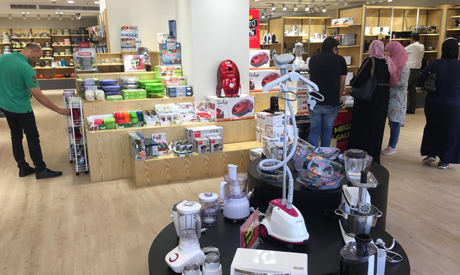
Private consumption is a major contributor to Egypt’s GDP
The three-and-a-half months during which the government imposed restrictions on the movement of individuals and night curfews to prevent the spread of the Covid-19 coronavirus have been tough on Egypt’s economy.
The Ministry of Finance has estimated that the government lost LE130 billion in revenues on the back of the crisis in its 2019-20 budget. Egypt’s GDP growth is also expected to drop by half according to the World Bank’s June 2020 Global Economic Prospects report.
This expects GDP growth to reach three per cent in the fiscal year 2019-20 that ended in June, down from the 5.9 per cent it had predicted for the Egyptian economy in January. For the current fiscal year, the bank expects growth of around two per cent, compared to a previous estimate of six per cent.
To mitigate such impacts the government has been intent on launching initiatives that could help the economy. The latest of these, launched earlier this week, aims at boosting consumption, a crucial component in the growth of the economy.
The initiative involves setting up a fund worth LE2 billion to stimulate domestic consumption, said Minister of Finance Mohamed Maait on the sidelines of a ceremony to inaugurate the Asmarat housing project earlier this week.
The fund will facilitate loans to people wishing to buy goods and services. It will also act as a guarantor to reduce risks for financing institutions.
It is part of a package of measures aimed to set in motion some LE100 billion worth of domestic spending, said Planning Minister Hala Al-Said, also speaking at the ceremony. Manufacturers and merchants will offer discounts averaging 20 per cent on consumer goods, and an additional 10 per cent discount will be offered to ration-card holders.
Subsidising discounts for card holders will cost the government between LE10 and LE12 billion, Maait said on television on Monday.
“Consumer spending is one of the most important driving forces of the Egyptian economy,” said Dina Mongi Ali, a consultant at NGage Consulting, a financial services firm. She said that according to Keynesian theory governments should stimulate spending to mitigate economic recessions, such as the one caused by the Covid-19 crisis.
“Think about what would happen if everyone stopped spending. Businesses would eventually go bankrupt and lay off workers, and the government would then have no one to tax,” she said.
The newly announced initiative will boost consumer spending and therefore increase the demand for goods and services, resulting in a rise in production, business activities, and revenues, lowering inflation rates and thus creating a healthier economy, she said.
“Consumer spending is a crucial component of GDP and the overall Egyptian economy,” Ali said, adding that Egypt’s private consumption contribution to Nominal GDP averaged around 78 per cent between September 2001 and December 2019 , according to calculations by CEIC Data, a global data provider.” Since private consumption accounts for the largest part of GDP, it is the key engine that drives economic growth,” said Aly. Between 2015 and 2019 real household spending had averaged an annual growth rate of 6.4 per cent, according to data from the Central Agency for Public Mobilisation and Statistics (CAPMAS) Aly pointed out.
These figures will be severely affected by Covid-19. According to the latest report from Fitch Solutions, an international provider of credit, debt market, and macro intelligence solutions, and available data from CAPMAS, real household spending growth is projected to be flat in 2020 with 0 per cent growth, she pointed out. The medium-term forecast for 2020-24 is an average annual growth rate of 2.2 per cent.
According to the data and calculations made by CEIC Data, Egypt’s Private Consumption contribution to Nominal GDP ratio available from September 2001 to December 2019 averaged 77.9 %
While the full details of the government initiative are to be announced towards the end of the month, it should include funding to help convert cars to run on environmentally friendly natural gas, including taxis, mass transportation vehicles, and passenger cars.
According to Ali, this initiative will help out the car industry, which has the potential to form one of the main pillars of industrial development in Egypt because of its dependence on a wide range of sectors and various feeding industries.
“The government’s efforts to support the automotive industry are linked to its overall strategy to boost local manufacturing,” Ali said.
The initiative will also include other types of goods. The Federation of Egyptian Industries (FEI) has said that it has begun receiving applications from producers to take part.
“The government is planning on boosting the economic recovery through encouraging demand and building supply through local manufacturing. The increase and development of this will have a huge and positive effect on increasing job supply, in addition to attracting investment rates in a number of industries,” Ali said.
This week’s initiative is the latest in a series of measures implemented by the government since March to soften the effects of the coronavirus crisis. These have included slashing the central bank’s interest rates by three percentage points, exempting late payments, non-performing loans, and ATM withdrawals from fines and fees for six months, and instructing banks to provide credit to companies to finance working capital and salaries.
The government has also offered industry-specific support, such as that extended to the tourism sector which saw business coming to a complete halt as a result of the crisis.
Ali believes the government’s measures in response to the Covid-19 pandemic have been proactive. “The government has been quick and responsive,” Ali said, praising the fact that all decisions were promptly announced to the public and revised periodically depending on the situation.
*A version of this article appears in print in the 16 July, 2020 edition of Al-Ahram Weekly
Short link: